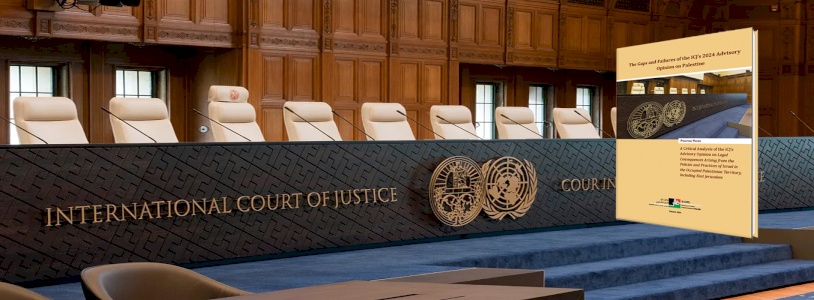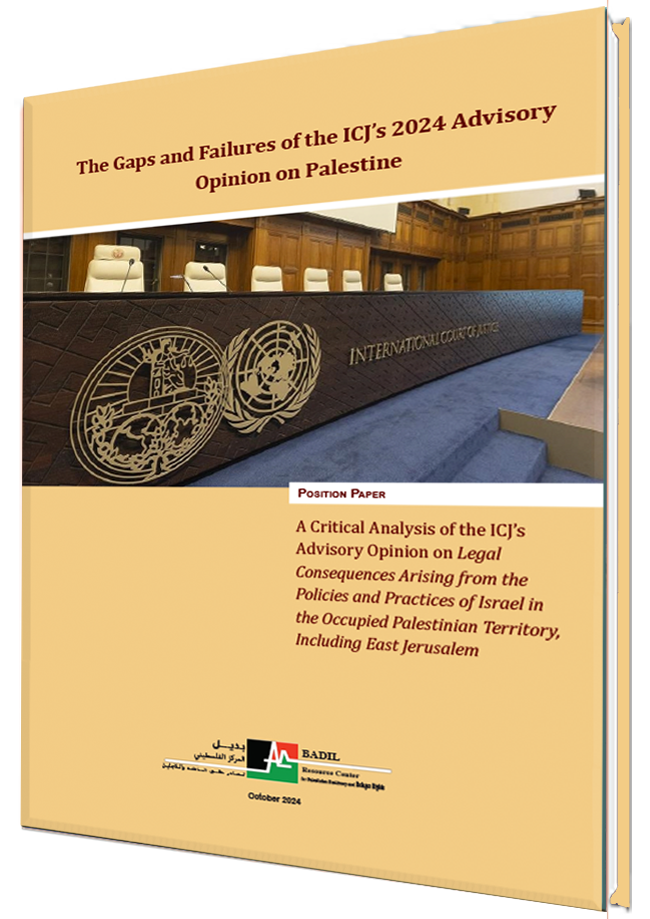Press Releases

 On 19 July 2024, the International Court of Justice’s (ICJ) Advisory Opinion on the Legal Consequences Arising from the Policies and Practices of Israel in the Occupied Palestinian Territory, Including East Jerusalem was issued and was hailed as a breakthrough by Palestinian and international audiences alike. While the 2024 Advisory Opinion determines Israeli policies and practices as unlawful and is stronger than the ICJ’s 2004 ruling on the Legal Consequences of the Construction of a Wall in the Occupied Palestinian Territory, the reality is that it contains gaps and flaws that significantly undermine the principles of international law and its implementation vis-à-vis the Palestinian people. As such, BADIL Resource Center presents its critical analysis of the 2024 Advisory Opinion titled, “The Gaps and Failures of the ICJ’s 2024 Advisory Opinion on Palestine.”
On 19 July 2024, the International Court of Justice’s (ICJ) Advisory Opinion on the Legal Consequences Arising from the Policies and Practices of Israel in the Occupied Palestinian Territory, Including East Jerusalem was issued and was hailed as a breakthrough by Palestinian and international audiences alike. While the 2024 Advisory Opinion determines Israeli policies and practices as unlawful and is stronger than the ICJ’s 2004 ruling on the Legal Consequences of the Construction of a Wall in the Occupied Palestinian Territory, the reality is that it contains gaps and flaws that significantly undermine the principles of international law and its implementation vis-à-vis the Palestinian people. As such, BADIL Resource Center presents its critical analysis of the 2024 Advisory Opinion titled, “The Gaps and Failures of the ICJ’s 2024 Advisory Opinion on Palestine.”
BADIL finds that the main and glaring fundamental flaws of the 2024 Advisory Opinion are its limited approach which decontextualizes both the historical and current context and ignores the root causes that define the Israeli system of domination. The flawed approach resulted in the partial and erroneous application of the legal frameworks, leading the Court to provide inaccurate and ambiguous determinations, solutions that exceeded its mandate, and weakened the potential for practical measures to hold the Israeli colonial-apartheid regime accountable.
This position paper first discusses the overarching decontextualization issue due to the adoption of a 1967 temporal and geographic approach that informs the ICJ’s 2024 Advisory Opinion. The Court applies a decontextualized analysis of Palestinian history that omits the root causes, leading to an incorrect and insufficient analysis of the current context, and resulting in a flawed and selectively politicized application of the rights to self-determination, return, and resistance. This position paper then explains how this decontextualization has led to the expansion of the ICJ’s mandate and the promotion of diplomatic and political “solutions.” Finally, the paper delves into how the 2024 Advisory Opinion influenced UNGA resolution A/ES-10/L.31/Rev.1 of 18 September 2024 entitled “Illegal Israeli actions in Occupied East Jerusalem and the rest of the Occupied Palestinian Territory.”
In the end, the 2024 Advisory Opinion, endorses the 2-state solution, not only overstepping its mandate but also essential pushing a conflict resolution paradigm placing the oppressed Palestinian people on the same level as the colonial oppressor – the Israeli regime. And by imposing this approach, the 2024 Advisory Opinion failed to substantially raise the legal ceiling to practically and effectively hold the Israeli regime accountable. It failed to give concrete or material recommendations to the UNGA and UNSC, leaving the ball in their court for these bodies to determine how to go forward to end Israeli illegal presence, policies and practices.
An accurate, unbiased, and just interpretation of the law in the 2024 Advisory Opinion would inform and urge the UNSC to impose sanctions on Israel. It would encourage Member States to boycott and sanction the Israeli colonial-apartheid regime and isolate it politically, militarily, financially, and culturally. It would commend and encourage support for the Palestinian national liberation struggle against its colonial oppressors. Finally, it would address the root causes by contextualizing the reality: the Palestinian people’s anti-colonial national liberation struggle against the Israeli colonial-apartheid regime that has oppressed them and violated their inalienable rights of self-determination and return since its inception.
